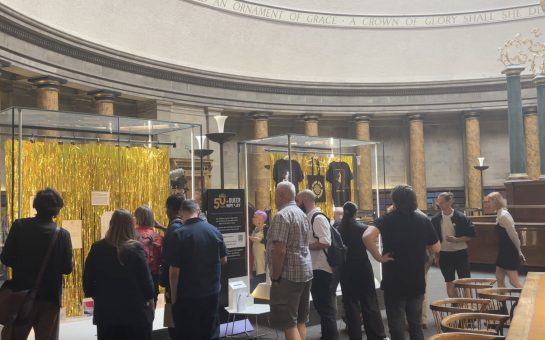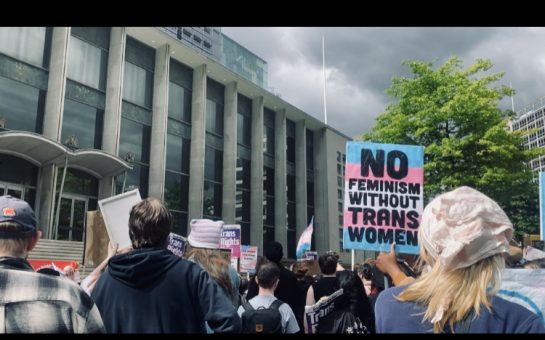To celebrate LGBT History Month, MM talk to LGBT figures from across Greater Manchester about their experiences of coming out and what progress they think the city still has to make towards equality.
Last week we spoke to Manchester councillor Kevin Peel who revealed how being gay inspired his career and said he was ‘proud’ to represent our great city.
Next up is Involvement Manager for The Lesbian & Gay Foundation (LGF), Andrew Gilliver.
The youngest of three boys, Andrew grew up in Sheffield, before moving to Liverpool to study and subsequently settling on Manchester as his adopted home.
During his time at LGF, Andrew has been involved in many of the organisations campaigns and is now focussing on LGBT health and social care issues across the whole of Greater Manchester.
Now in his 50th year Andrew is settling down a little in terms of being a ‘social butterfly’ but his work schedule provides more than enough social outlets to keep him busy.
How old were you when you first realised you were L/G/B or T?
Probably from a very early age. I just could never see myself following in the heterosexual footsteps that I saw my brothers doing. I’m the youngest child and although I tried a few times in my teens to ‘tow the line’ because convention suggested it and I was so insecure, I was always uncomfortable.
I was the kind of child who was constantly told that boys don’t play dress up, or mess with their mum’s make-up. Everything that seemed natural and fun to me didn’t seem to be accepted behaviour.
Being from Yorkshire we have certain rugged role models to follow. I’m from a football family and I just couldn’t care less about it. Watching ABBA win Eurovision and absolutely falling in love with Agnetha (or wanting to be her) was probably a clue!
Could you tell us your ‘coming out’ story?
It seemed like a long struggle, with myself mainly. Reaching puberty in the early 1980s was a horrible time for gay men with all the hysteria and panic around AIDS so just as I was beginning to feel strong enough in myself, every doubt I had ever had about who I was and if it was ok to be that person was reinforced with a real fear that if I was to become that person, my life would be very short.
I was 21 when I finally plucked up the courage to go and see a counsellor and it was the first time that anyone had ever told me it was no big deal. The people in your life that are important will still be there and those that won’t you just have to forget them.
I didn’t have to ‘admit’ to being anything at all, I just had to be myself and learn to be happy with who I was.
From coming out to now, what are the lessons you have learnt about yourself with regards to you and your sexuality?
That it is my business and no-one else’s. Those early years of insecurity and struggle were brought on by other people’s narrow view of who and what men and women are and what their relationship to one another should be.
I didn’t want to upset anyone because I see now that most people were just very concerned for me but looking back, I was much braver, stronger and more questioning as a young child than before I allowed myself to be swayed by the opinions of others.
What are the biggest challenges still to overcome in the UK for the LGBT community?
I think there are many and I don’t think often we know what they are until they present themselves. We have come so far, relatively quickly in terms of equality in legislation and many people think that the job is done now two people of the same gender can get married but really, we have only just begun to be able to live our lives as free as we possibly can.
How people view us, treat us and how we deal with fitting into a society that is still focused on heterosexuality as ‘the norm’. Every day I hear from LGBT people about the challenges they are having in all areas of their lives and these are usually brought about by other people’s attitudes and prejudices so in a way we haven’t progressed as far as we think we have.
Let’s not be silent about homophobia #DayOfSilence pic.twitter.com/chMK641G0C
— Andrew R Gilliver (@andrewrgilliver) April 11, 2014
We have to unite as a community in support of one another, whatever our differences and try to get people to understand that growing up as an LGBT young person is incredibly difficult, growing older can be so very isolating and in-between youth and old age we still have to fight to be heard, accepted and understood .
And what about for the rest of the world?
We’re all on the same journey wherever we live, but it would be far too easy for those of us in most western developed countries to just get on with our lives but there are people like us in every corner of the world struggling to be heard and fighting for their freedoms.
As a country that has had such a negative impact in the past when imposing our narrow British views on sexuality to half of the world, we should now be honest and say look, we got it wrong and we need to help those from overseas whenever we can. We are fortunate to have been born in a place and at a time where we can have this conversation.
It means nothing if we don’t acknowledge this with a view to helping others who, but for an accident of birth are living in fear for their lives just for being who they are.
What would you say to your young self or a young LGBT person with the knowledge you have now about coming out?
Don’t beat yourself up about it. Find someone whose opinion you really value and talk to them about these issues. You aren’t the only person to feel this way and the sooner you find your real friends, those who will accept you for whoever you are the happier you will be.
If you can’t talk in person call one of the many organisations we have in Manchester like The LGF Helpline. If there is one thing that will never change it is that young people will always need to talk to others who will not judge them and will understand what they are going through. Look after yourself and don’t waste any time on those who do not wish anything but the very best for you.
There are so many fantastic groups and support organisations out there and you really don’t know who you are until someone else allows you the freedom to express yourself without fear or prejudice.
How does being gay impact on your job/career?
I know that I am lucky; I work with some amazing people, all extremely different and all fantastically talented. The reason I have survived for fifteen years in the same organisation is that it allows people to grow at their own pace and the benefit of having people with such rich life experiences coupled with youthful enthusiasm makes it such a vibrant place to be.
We are RED, rouge,roja,Rossi,rot,rood! Etc for #WorldAidsDay with @mrscraffey pic.twitter.com/RWablMJtEr
— Andrew R Gilliver (@andrewrgilliver) December 1, 2014
If I am having the worst day ever, tired or depressed for whatever reason, my colleagues without even knowing what I am going through will lift me right up just by being themselves and continuing to speak up for those in our communities who are seldom heard.
Those early struggles have helped me to remember what is important and that is to stand up for what you believe in and when you are confident in yourself you can go on to support others. I have only ever been surrounded by people who support me. I wouldn’t work for any individual or any organisation whose values I didn’t respect. Life is too short to compromise your own existence.
What are your thoughts on Manchester’s LGBT scene? Is the Village still the heart of it in your mind?
You know, I never go out and I value my quiet time, my home, my partner and my dog. Manchester is a place that if we weren’t lucky enough to have been born here we would have gravitated to so that we can fulfil our dreams, whether that’s to study, to work or to celebrate living in such a wonderful diverse place.
I think we give ourselves a hard time because we do live in such a great city that the bar is always set so very high. The village is extremely important, it is and always will be the spiritual home of our community going back decades but of course it is important to integrate too.
One isn’t more important than the other, we need to value our heritage and ensure that we enjoy all that the city has to offer.
What makes Manchester a good place to live in for members of the LGBT community?
How long have you got? I’m a northerner so I will never leave the north but Manchester has something special, it has that traditional warmth but it has ambition too, I don’t think that in any way stops it being such a friendly place.
Manchester is a ‘can do’ city and there really is room for everyone. In a way I think that is why I love it so much, no matter who you are, where you come from or what you want to become, you will have the opportunity to realise your ambitions. I know so many people who have travelled to London or overseas and so many of them return.
We may not have the most glamourous of locations but no matter how the city grows it will always be grounded. It is never too big to get lost in and not too small so there is always the prospect of an air of mystery just around the corner.
Manchester is a real community and a wonderful melting pot, it’s no wonder that so many LGBT folk the world over make our home here or regularly travel here.



